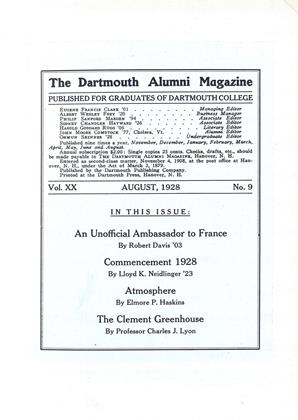Speaking before the Dartmouth Alumni Council in opening the five-day program of the 159 th Commencement of Dartmouth College, President Ernest Martin Hopkins announced June 15 that the College had just received the promise of two gifts totalling $1,500,000 for developing the honors courses recently introduced into the Dartmouth curriculum. Ohe half the sum, or $750,000, is in the form of a conditional gift from the General Education Board of New York City. At a meeting of the members and trustees of the Board held recently, action was taken authorizing this gift for the purpose of providing endowment for instruction in honors courses under condition that a like amount be secured by the College trustees from another source.
President Hopkins said that he has received assurance of this additional sum of $750,000 from a donor who wishes the gift to remain anonymous.
In announcing the gift President Hopkins explained the purpose of the honors courses and he said that the increased funds available for instruction will enable the College to proceed rapidly in developing this new field in the academic curriculum. The statement given by President Hopkins follows :
"It has been a constantly recurring criticism of the college of liberal arts that, in its endeavors to meet the needs of its students in general, it has not been able to do justice to those whose mental capacities and intellectual interests raise them above the average of their fellows.
That this criticism is valid is recognized by most of those who have to do with the undergraduate college. There is little dissent to the advisability of separating, in the later years of the college course, students of proved capacity from their fellows, of relieving them of the technical rquirements which seem necessary for the college at large, of separating them entirely from formal courses, the pace of which is determined by men of inferior capacity. Such gifted students may well be given a degree of freedom which is not advantageous for others; their intellectual progress may best be forwarded by methods and judged by tests in keeping with their capacities; and they would profit by receiving a degree of personal attention by instruction, individually or in small groups, which it would be difficult to justify in the case of others. Only the difficulty of financing the special and relatively expensive types of instruction adapted to this group prevents a general application of the honors method.
"In its new curriculum Dartmouth has already set up the machinery for work of this tye. It is now being applied to its fullest extent in the major work of one department, and with some restrictions in that of three others. Even applied on this limited scale the results seem to indicate the high effectiveness of the method. The resources made available through this latest gift to the College should make it possible to provide honors work for all students whose intellectual qualifications are such as to warrant the increased expense of instruction. There is every reason to believe that the application of such methods will result in a notable advance in the effectiveness of the institution."
The announcement of this gift to endowment came on the eve of the dedication of Dartmouth's Baker Memorial Library, the $1,000,000 gift of George F. Baker in memory of his uncle, Fisher Ames Baker, a graduate of Dartmouth in 1859. Newton D. Baker, former Secretary of War, delivered the dedicatory address. Reuning alumni, parents of members of the graduating class and guests and friends of the College also inspected the new Natural Science Building, erected at a cost of nearly $500,000, through the generosity of an anonymous benefactor, Gile Hall, a new dormitory and the Clement Botanical Building. The chime of fifteen bells installed in the 200-foot tower of the Baker Library was heard for the first time at Commencemnt. The bells are the result of a gift of $40,000 by an unknown donor. Immediately following the graduation exercises in Webster Hall June 19 construction work was started on the $2,000,000 building program recently announced by the Board of Trustees. This includes the erection of the Carpenter Fine Arts Building, the gift of Frank P. Carpenter of Manchester, N. H., the Sanborn English House, made possible through the $1,500,000 bequest of the late Edwin W. Sanborn '7B, two additional dormitories and eight homes for .members of the faculty and their families. Tentative plans also call for the erection of an indoor ice-hockey rink. J. Fredrick Larson is the architect for Dartmouth.
 View Full Issue
View Full Issue
More From This Issue
-
 Article
ArticleTHE UNOFFICIAL AMBASSADOR TO FRANCE
August 1928 By Robert Davis '03 -
 Article
ArticleEditorial Comment
August 1928 -
 Article
ArticleMEETING OF ALUMNI COUNCIL
August 1928 -
 Books
BooksGREEK THOUGHT IN THE NEW TESTAMENT.
August 1928 By Charles D. Adams -
 Sports
SportsSUMMARY OF ATHLETIC SCORES
August 1928 -
 Class Notes
Class NotesClass of 1918
August 1928








